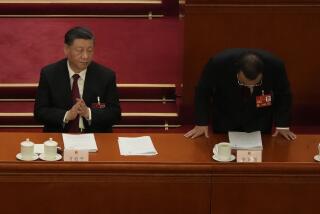The Notable Legacy of Deng Xiaoping : ‘Paramount leader’ brought China into the mainstream
- Share via
Mao Tse-tung led a revolution that brought epochal social and economic change to China at a terrible human cost. The death toll from state-induced famine and state-sanctioned brutality numbered in the tens of millions. Deng Xiaoping led a revolution no less history-changing for China, but one whose consequences seem sure to be far more lasting and certainly vastly more beneficial to the Chinese masses.
For Deng achieved what Mao, with his heedlessly cockeyed schemes for the rapid forced development of a huge and backward land, could only feverishly dream of. Deng shaped and presided over the policies that brought China into the modern mainstream. Gaining control over the Communist Party and the military in the late 1970s, he launched the pragmatic economic reforms that in time brought prosperity to hundreds of millions of Chinese and opened China to the world.
But Deng the reformer was also unambiguously Deng the repressor. Even while undoing much of what Mao had wrought, Deng continued to insist on the absolute primacy of centralized decision-making. No challenge to the authority of the party would be tolerated. Those who bravely drew together to try to test that prohibition, most notably at Tiananmen Square in 1989, were mercilessly crushed. Those relative few who subsequently raised their voices to protest abuses of human rights and the absence of civil liberties paid for their courage with long sentences in China’s harsh prisons. Whatever political dissent remains in China today is covert, lonely and silent.
Deng officially retired in 1990 and made his last public appearance three years ago, looking unmistakably infirm and apparently mentally confused. Yet, however distant he had become from the conduct of China’s affairs, he remained even in retirement and senility an officially venerated presence, the “paramount leader” whose name continued to be invoked to legitimize whatever decisions the party made. It was a mark of Deng’s enormous continuing prestige that those who have long maneuvered to assume his mantle took great care during his last years not to let their competition break into the open.
Deng’s death, at 92, closes a momentous era. The terrible economic failings of the Maoist era have been largely reversed, China’s international stature has grown. It is a notable legacy. Now the world waits to see how Deng’s heirs will manage their inheritance.
More to Read
Sign up for Essential California
The most important California stories and recommendations in your inbox every morning.
You may occasionally receive promotional content from the Los Angeles Times.













